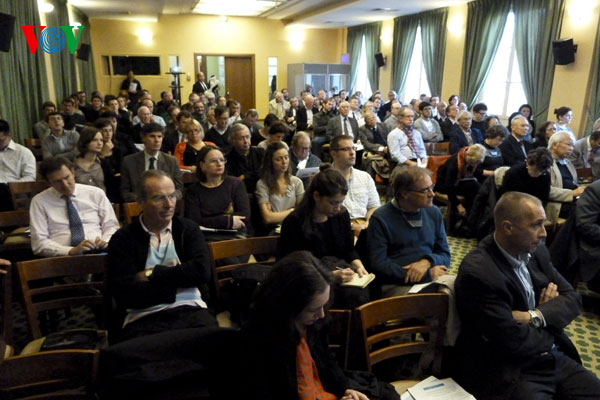Int’l scholars reject China’s East Sea demands
(VOV) - International scholars have presented evidence at a recent workshop in Paris, rejecting China’s sovereignty claim in the East Sea, especially its U-shaped line.
About 300 delegates, including many scholars on Asia studies from France and other countries, presented reports on international law, political and economic challenges in the East Sea, and solutions to the ongoing marine dispute in the region.
 |
| Da Tay is one of the islands of the Truong Sa archipelago |
The presentations concentrated on the role of the Association of Southeast Asian Nations (ASEAN) in the matter, the possibility of bringing the case to an international tribunal, or authenticating the historical evidence given by China.
Professor Monique Chemillier Gendreau from the Paris Diderot University in France, Professor Erik Franckx from Vrije University Brussels in Belgium, and Professor David Scott from Brunel University in the UK made an in-depth analysis of China’s U-shaped line and confirmed that the Chinese map is not in line with international norms and practices.
Professor Gendreau quoted current international law saying a nation can only claim sovereignty over an island if the island has existed under its jurisdiction for a long time and an administrative system has been established there.
 |
International law requires clear evidence while Chinese arguments are based on history books or literary works, she said, citing evidence that Vietnam established its administrative organisation to govern the Hoang Sa archipelago from the 18th to the mid 19th century under the French colonialists.
More importantly, no regional countries objected to the management until the administration of South Vietnam legally took over the group of islands, said the French professor.
Several French documents show that in the 1930s the Chinese administration was still confused about the Truong Sa archipelago, another group of disputed islands in the East Sea, and did not mention them on its national map.
Experts confirmed that China’s wording such as ‘adjacent’ or ‘historic’ waters are not used in international treaties, including the 1982 Montego Bay Declaration to which China has acceded.
They once again underlined the importance of the East Sea to global geo-politics and trade, especially regarding the exploitation of large reserves of crude oil, that have prompted a number of countries to enter the dispute.
In a panel discussion, naval experts and representatives of government officials, including Christian Lechrvy, advisor to French President Francois Hollande, all agreed that the situation in the East Sea is very complex.
However, they ruled out the possibility of a traditional military clash, reasoning that all regional countries possess modern weapons and none wants to become involved in a confrontation without a high possibility of success. They said the bottom line is finding a common voice amongst all parties concerned.
Lechervy spoke of the East Sea disputes amongst several regional countries that have been ongoing since 2008 and downplayed worries about a diplomatic impasse. He said multilateral forums will help solve the disputes peacefully.
 |
Experts stressed that the 1982 United Nations Convention on the Law of the Sea (UNCLOS) must be observed to define marine boundaries and common fishing grounds, and to conduct joint patrols at sea.
They called on parties concerned not to build more military bases on disputed islands, and deploy civil and police forces to maintain security instead.
They held that all parties concerned and other countries like the US and France need to take a constructive attitude and make positive contributions to negotiations in order to ease the situation in the East Sea, which is a common international issue.
Professor Gendreau even recommended turning the East Sea into an international sea area subject to international law which could benefit all countries concerned and ensure peace throughout the entire region.
